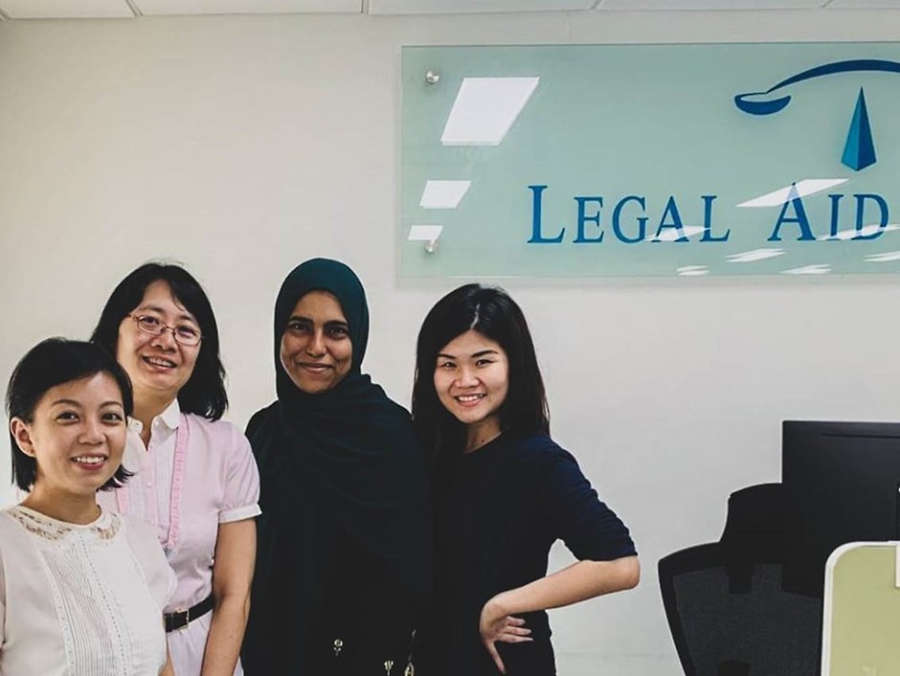
Soaring Paralegal Eagles – the Specialist Legal Executives of the Legal Aid Bureau
The Legal Aid and Advice Act (Cap. 160) (LAAA) was amended in May 2019 to enable the Director of Legal Aid to appoint selected legal executives (LEs) in the Legal Aid Bureau (LAB), who have suitable experience and qualifications, as Specialist Legal Executives (SLEs).1See section 3 of the LAAA. Also see Lim, Thanabal, Ibrahim, and Li, “Strengthening Access to Justice – Key Amendments to the Legal Aid and Advice Act”, Singapore Law Gazette (May 2019). The SLE scheme allows some of LAB’s best LEs (equivalent to paralegals in private law firms) to give oral legal advice and appear and plead in the Family Justice Courts (FJC) in certain straightforward matters. This article2We wish to thank Mr Matthew Chia and Ms Chung Cui Yi (Corporate Communications Division, Ministry of Law), and Ms Liu Yabing (Strategic Planning and Data Office, Ministry of Law) for their comments on an earlier draft of this article. All errors remain entirely our own. provides an overview of the SLE scheme and introduces the pioneer batch of SLEs.
LAB’s Legal Executives
LAB has a team of 20 LEs assisting LAB’s Legal Officers (“LO”) with LAB’s cases. The LEs do a significant amount of work at LAB, including taking instructions from applicants for legal aid (applicants) and managing them, helping with divorce discussions3These are sessions facilitated by LAB to help parties reach an amicable settlement before divorce papers are filed. and drafting straightforward court documents. They are also trained in handling emotionally distressed applicants and making social service referrals for those in need. Each LE is effectively bilingual in English and their mother tongue. Some are even conversant in Chinese dialects as well.
The Specialist Legal Executive Scheme
Under the SLE scheme (divorce module), selected LEs are gazetted as SLEs to handle uncontested civil divorce cases where the gross value of the matrimonial assets does not exceed S$1 million, and where the opposing party does not participate in the proceedings or where parties are likely to reach an agreement on the divorce and the ancillary matters. The SLEs are allowed to give legal advice to, and attend court for, applicants in such cases. This provides selected LEs with the opportunity to take on higher-level work, while freeing up LOs for more complex casework – thus enabling all LAB officers to develop professionally.
Eligibility Criteria, Selection Process and Training
Only LEs who have at least three years of work experience as a paralegal (whether in LAB or in a private law firm), and at least a year’s experience working in LAB are eligible to become SLEs. This ensures that the SLEs have the requisite training, and that LAB has enough time to assess their ability.
LAB then selected four LEs from the current pool of eligible candidates to be the pioneer batch of SLEs (see below for details about them). The candidates underwent two phases of in-depth training over the period of a year: Phase 1 of the training put them through “mini law school” involving lectures, tutorials and quizzes, whilst Phase 2 of the training consisted of practical training sessions. The SLE curriculum was largely developed in-house by LAB, with training provided by then NUS Associate Professors Lim Lei Theng and Ruby Lee on legal writing and analysis. In addition to legal writing and analysis, the curriculum included modules on family law and procedure in the FJC, ethics, court etiquette, and basic property, company and evidence law.
At the start of their training, the candidates were each assigned to two mentors who are senior LOs in LAB. The candidates then attended court hearings as observers with their mentors as part of their Phase 1 training. For Phase 2 training, the candidates’ advocacy and written skills were developed through written correspondence exercises, mock mediation, advisory and court hearing sessions conducted by senior LOs in LAB.
The candidates were also required to undergo stringent assessments at different stages of their training (namely, Quarterly, Mid-Course and Final Assessments). The assessments ranged from multiple choice questions and structured questions on family law and procedure, to mock mediations and advisory sessions.
The candidates also had to pass three practical assessments – the first of which was before three of LAB’s Assigned Solicitors, and the second and third of which were before FJC District Judges.
The candidates passed all their written and practical assessments and their mentors recommended to the Director of Legal Aid that they be gazetted as SLEs. They were duly gazetted in March 2020.

From left to right: Goh Xin Hui, Lynette Heng, Latifah Hassan Ali and Rae-Anne Lim. Photo taken before COVID-19
The Pioneer Batch of Specialist Legal Executives
The four pioneer SLEs, Goh Xin Hui, Lynette Heng, Latifah Hassan Ali and Rae-Anne Lim, have diverse work and educational experiences. Xin Hui was a former junior college Chinese Language teacher and a court interpreter before joining LAB in August 2016. Lynette was an LE in LAB for eight years, before she left to pursue a law degree and to qualify as a lawyer. She practised in a private law firm, and then re-joined LAB as an LE eight years ago. Latifah, who joined LAB in December 2016, has 16 years of family law experience under her belt, having previously worked as a paralegal in the family law department of a local law firm. Rae-Anne, who joined LAB in January 2015, had previously worked as a paralegal in a private law firm, and is currently a final year law student at the Singapore University of Social Sciences (SUSS).
All four SLEs decided to try for the scheme because they wanted to challenge themselves.
“The scheme was a good opportunity for me to learn family law principles and challenge myself to do greater things”- Xin Hui
Joining the SLE scheme was an easy decision for Xin Hui because she had always been curious about why LOs sought specific instructions from applicants on certain aspects of a divorce case, and what factors the court would usually consider when granting an ancillary matters order in a divorce proceeding. Joining the SLE scheme therefore allowed her to learn more about family law principles and do higher level work.
For Rae-Anne, the SLE scheme complemented her law studies, as she could see how legal principles and cases played out in real life, enabling her to grasp the concepts more easily.
Their journey to become SLEs was not entirely smooth-sailing – the SLEs had to juggle rigorous training and assessments on top of their daily work as LEs. However, looking back on the journey, Rae-Anne has no regrets, despite many burnt weekends and late nights, because of how much she learnt. She said:
“The training was very useful. It prepared us [the SLEs] on what to expect during mediation and how we should communicate with our opposing counsels and clients. I also obtained useful practical tips on mediation advocacy from experienced family law practitioners and FJC judges [during the training].”
Likewise, Lynette was grateful for the comprehensive and structured training sessions which gave her a solid foundation and built her confidence to handle actual cases, in particular those which involve the division of matrimonial assets.
When asked to recount one memorable moment of her training as an SLE, Latifah’s answer was that it had to be her first supervised mediation session with an LO before a District Judge in the FJC. She said that while it was a nerve-racking experience, she felt extremely satisfied when she managed to successfully facilitate an amicable settlement between the parties on the ancillary issues. Latifah added that she would encourage other LEs to be SLEs because it would give them the satisfaction of advocating for vulnerable applicants in court and seeing cases through to completion independently.
Oversight and Discipline
To maintain the high standards of its SLEs, the SLEs’ mentors will audit them (i.e. review their work and sit in for some of their court hearings) for a period of six months to a year4This period may be extended depending on the SLE’s performance. from the time the SLEs are gazetted. Even after this [audit] period, the SLEs will remain under the supervision of their mentors, whom they can approach for help when necessary, which is no different from a junior LO who has guidance from a more senior LO within LAB.
Like private lawyers, the SLEs are also subject to ethical rules. SLEs are governed by the Civil Service disciplinary framework, which is based on the Government Instruction Manual. If the SLEs are found to have breached these rules, they will be held accountable and may face disciplinary measures which include dismissal, suspension, and reduction in rank. LAB may also cancel the gazette of any SLE who has breached any ethical rules, so that they will not be able to do SLE work anymore.
Conclusion
Given that divorce cases form the bulk of LAB’s work,5In 2020, LAB handled 1308 divorce files out of a total of 3460 legal aid applications. The other files were for other subject matters such as Syariah Court divorces, probate and letters of administration, deputyship under the Mental Capacity Act and other matters. the SLE scheme has allowed high performing LEs to handle certain straightforward divorce matters independently, thereby expediting straightforward cases in LAB. The scheme not only enhances LEs’ professional development by creating an additional career pathway, but also gives LOs greater bandwidth to take on more complex cases. With the right people doing the right level of work, LAB’s overall efficiency has also been enhanced.
Since March 2021, LAB has also expanded the SLE scheme to include certain types of uncontested probate and letters of administration cases, as well as certain types of Syariah Court divorce cases.
We will continue to review the scheme and provide rigorous training to our SLEs so that they can serve our applicants in a meaningful way, develop themselves professionally and contribute to the success of LAB.
LAB aims to provide quality legal aid, advice and assistance to persons of limited means. We offer legal representation in a wide range of civil matters including divorce, monetary claims, custody of children, estate matters and claims for compensation in injury or medical negligence cases. Additionally, LAB is supported by a panel of volunteer lawyers, known as Assigned Solicitors. These lawyers handle cases that require special expertise, such as cases involving Syariah Law.
For further information, please refer to our website at: https://lab.mlaw.gov.sg.
Endnotes
| ↑1 | See section 3 of the LAAA. Also see Lim, Thanabal, Ibrahim, and Li, “Strengthening Access to Justice – Key Amendments to the Legal Aid and Advice Act”, Singapore Law Gazette (May 2019). |
|---|---|
| ↑2 | We wish to thank Mr Matthew Chia and Ms Chung Cui Yi (Corporate Communications Division, Ministry of Law), and Ms Liu Yabing (Strategic Planning and Data Office, Ministry of Law) for their comments on an earlier draft of this article. All errors remain entirely our own. |
| ↑3 | These are sessions facilitated by LAB to help parties reach an amicable settlement before divorce papers are filed. |
| ↑4 | This period may be extended depending on the SLE’s performance. |
| ↑5 | In 2020, LAB handled 1308 divorce files out of a total of 3460 legal aid applications. The other files were for other subject matters such as Syariah Court divorces, probate and letters of administration, deputyship under the Mental Capacity Act and other matters. |






